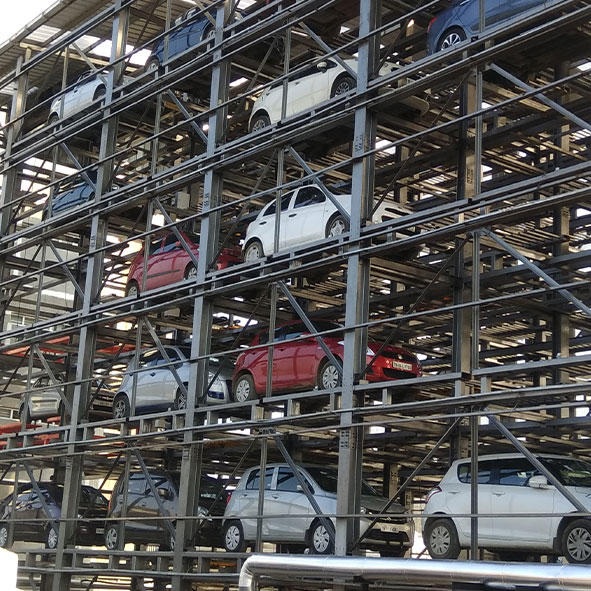As urban populations continue to soar, one of the greatest challenges that modern cities face is parking. Streets are getting busier, spaces are getting tighter, and the need for innovative parking solutions is more critical than ever. Traditional parking systems simply can't keep up with the growing demand. The future of car parking lies in smart, efficient, and space-saving systems that can cater to the needs of densely populated urban environments. Let’s explore how these advanced parking solutions are shaping the future of cities and transforming how we park.

The Growing Need for Innovative Parking Solutions
Urban expansion has brought with it a surge in vehicle ownership, leading to an increasing strain on parking infrastructure. In many cities, finding a parking spot has become an everyday frustration. As cities continue to grow vertically with skyscrapers and dense housing complexes, parking lots are often an inefficient use of space. The future demands solutions that can optimize every square foot of land. Innovative car parking systems are now emerging as the answer, providing the necessary efficiency and scalability to meet these urban challenges.
Automated Parking Systems: Revolutionizing Space Management
At the heart of future parking solutions lies automation. Automated parking systems (APS) are designed to maximize the use of limited space by stacking cars vertically or horizontally in a compact, organized manner. These systems eliminate the need for ramps and driving lanes, which are typically found in traditional parking lots, saving up to 60% of space. Automated systems can store more vehicles in a smaller footprint, making them ideal for urban environments where land is scarce. By using robotics and elevators to move cars into storage spaces, APS also reduces the time and effort required by drivers, making parking a hassle-free experience.
Smart Parking Technology: The Future of Convenience
Smart parking is another innovation that is gaining momentum in urban cities. With smart parking, real-time data is used to monitor available parking spaces, guiding drivers to the nearest available spot. This technology often incorporates sensors, mobile apps, and cloud-based systems to provide users with up-to-the-minute information on parking availability. Smart parking not only saves time for drivers but also reduces traffic congestion and emissions, as cars spend less time circling the block in search of parking. In the future, smart parking will likely be integrated into the broader network of smart cities, creating a seamless and intelligent transportation ecosystem.
Vertical Parking Systems: Making the Most of Urban Space
In cities where space is at a premium, vertical parking systems are becoming a game-changer. These systems use elevators or lifts to stack vehicles on top of one another in a vertical configuration, minimizing the ground area required for parking. Vertical parking towers can accommodate dozens or even hundreds of cars in a fraction of the space that a traditional parking lot would take. For urban developers, this means more land can be allocated for other essential uses, such as housing, green spaces, or commercial projects, without compromising on parking capacity. As cities continue to grow upward, vertical parking systems will become an integral part of urban infrastructure.
Sustainable Parking Solutions: Greener Cities, Cleaner Air
As cities worldwide grapple with environmental concerns, sustainable parking solutions are becoming increasingly important. Traditional parking lots contribute to urban heat islands, where vast stretches of asphalt absorb and radiate heat, exacerbating climate change. Modern car parking systems are being designed with sustainability in mind, incorporating energy-efficient technologies, renewable energy sources like solar panels, and even green roofs to mitigate environmental impact. Additionally, by reducing the time cars spend idling and searching for parking, these systems help cut down on carbon emissions, contributing to cleaner air and greener urban landscapes.
Modular Parking Systems: Flexibility for a Growing City
Modular parking systems are another forward-thinking solution designed for flexibility and scalability. These systems are built using prefabricated modules that can be assembled and disassembled as needed. This adaptability makes them an excellent choice for cities with fluctuating parking demands. For instance, a modular system can be expanded as the population grows or moved to another location as the city’s needs change. Modular parking systems also reduce construction time and costs, offering a practical and efficient way to address parking shortages in growing urban centers.
Enhancing Security with Advanced Technology
Security is a critical concern for both drivers and city planners. Future car parking systems are integrating advanced technologies like biometric access, surveillance cameras, and automated entry and exit points to enhance the safety of vehicles. Automated and smart systems limit human intervention, reducing the risk of theft or damage. Many modern parking facilities are also equipped with real-time monitoring systems that notify users of suspicious activities or accidents. By leveraging cutting-edge technology, these parking solutions offer peace of mind to both vehicle owners and facility operators.
Challenges and Considerations for Implementation
While the benefits of futuristic parking systems are undeniable, their implementation comes with its own set of challenges. High installation costs, particularly for fully automated systems, can be a barrier for some cities or developers. Maintenance and technical support are also crucial to ensure smooth operation, and not all cities are equipped with the infrastructure to support these advanced systems. However, as technology continues to advance and costs decrease, we can expect these solutions to become more accessible and widespread in urban areas.
Conclusion: The Road Ahead for Urban Parking
The future of car parking in urban cities is rapidly evolving, with smart, automated, and sustainable solutions leading the way. These systems not only address the pressing issues of space and congestion but also improve convenience, security, and environmental impact. As cities grow and parking demands increase, embracing innovative parking solutions will be key to creating more efficient, livable, and greener urban environments. The road ahead for urban parking is full of potential, and the integration of these systems is a vital step toward the cities of tomorrow.




